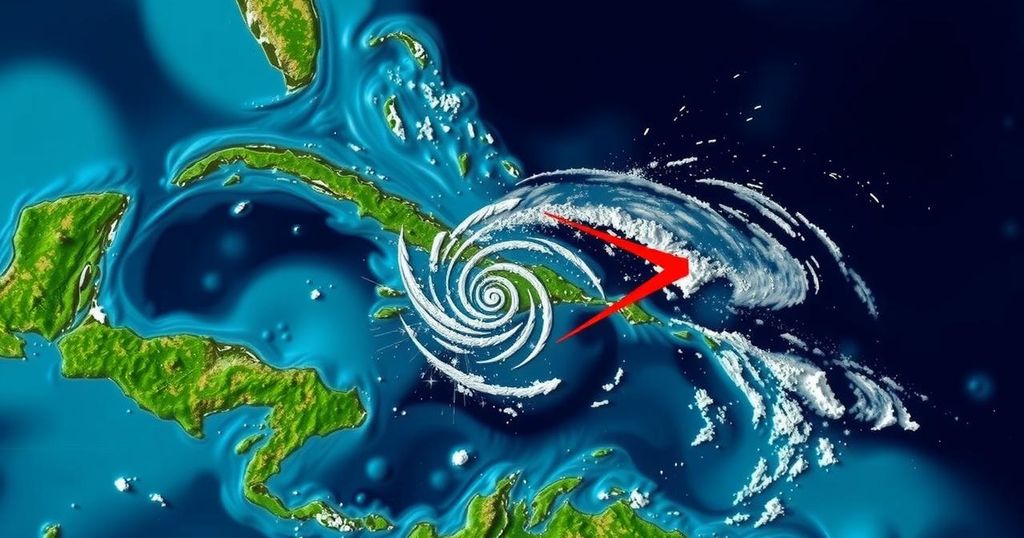Tropical Storm Oscar Approaches the Bahamas After Impacting Cuba

Tropical Storm Oscar is approaching the Bahamas after hitting Cuba as a Category 1 hurricane, resulting in at least six fatalities. Initially a surprising storm given its small size, Oscar exhibited wind speeds of 40 mph while moving north-northeast. It is predicted to bring heavy rainfall to the southeastern Bahamas, and a tropical storm warning is in effect. Meanwhile, the Atlantic hurricane season forecasts an above-average activity, with Oscar being the 15th named storm of the season.
On Tuesday, Tropical Storm Oscar was reported to be moving steadily towards the Bahamas after making landfall as a Category 1 hurricane in Cuba. The storm has tragically resulted in the deaths of at least six individuals as it brought heavy rainfall to an already struggling island that recently endured widespread power outages. According to the National Hurricane Center in Miami, as of Tuesday morning, Oscar was situated approximately 45 miles (75 kilometers) south-southeast of Long Island in the Bahamas, exhibiting wind speeds of 40 mph (65 kph) and advancing north-northeast at 12 mph (19 kph). The National Hurricane Center assessed Oscar as only “barely a tropical storm at this time,” with expectations of up to 5 inches (13 centimeters) of rain across the southeastern Bahamas, and isolated areas potentially receiving as much as 8 inches (20 centimeters). Consequently, a tropical storm warning was issued for the central and southeastern Bahamas. Remarkably, Oscar is noted as the smallest recorded hurricane, with a wind field measuring just about 6 miles (10 kilometers) in diameter. The storm’s rapid intensification caught meteorologists off guard, as it made landfall on Grand Inagua Island in the Bahamas on Saturday prior to hitting eastern Cuba late on Sunday. Hurricane specialist Michael Lowry remarked on the surprising nature of the storm, stating, “It’s not often we see a colossal failure in hurricane forecasting,” indicating that forecasting models did not predict Oscar’s eventual categorization as a hurricane. In terms of rainfall, Oscar dropped significant amounts, with some areas in eastern Cuba experiencing over 15 inches (38 centimeters) on Monday, and warnings issued for severe flooding and possible landslides. The fatalities associated with the storm were confirmed in Guantánamo. Furthermore, Oscar’s impact comes at a critical time for Cuba, which is grappling with the aftermath of a major blackout that has sparked protests, accompanied by stern government warnings against civil unrest. Oscar is classified as the 15th named storm and the 10th hurricane of the Atlantic hurricane season, which runs from June 1 through November 30. The National Oceanic and Atmospheric Administration has projected a heightened level of activity for the current Atlantic hurricane season, anticipating between 17 to 25 named storms by its conclusion, with four to seven expected to reach major hurricane status (Category 3 or higher). In parallel, the Pacific Ocean hosts Tropical Storm Kristy, which was located 375 miles (605 kilometers) west-southwest of Acapulco, Mexico, exhibiting maximum sustained winds of 50 mph (85 kph) and moving west-northwest at 15 mph (24 kph), with expectations for it to become a hurricane by nightfall.
Tropical Storm Oscar’s evolution from a Category 1 hurricane to a weakening tropical storm illustrates the dynamics associated with hurricane formation and tracking within the Atlantic basin. The phenomenon of small hurricanes leads to challenges in forecasting, as smaller storms can behave unpredictably. The issue is further compounded by the context of Cuba’s infrastructural setbacks, such as recent power outages which provide additional complexities in managing the local impact of storm-related disasters. The Atlantic hurricane season notoriously varies in intensity based on a range of climatological factors, and signs of an active season arise from warmer ocean temperatures, which can fuel storm development.
In summary, Tropical Storm Oscar has made its mark as a historic weather event, not only due to its small size and rapid intensification but also owing to its significant human cost and impact on Cuba’s already strained infrastructure. The storm serves as a reminder of the unpredictable nature of hurricanes and underscores the importance of effective forecasting and preparedness in the face of such climatic phenomena. As the Atlantic hurricane season continues, the potential for further storms remains high, emphasizing the need for ongoing vigilance and responsive measures to safeguard affected communities.
Original Source: www.seattletimes.com






